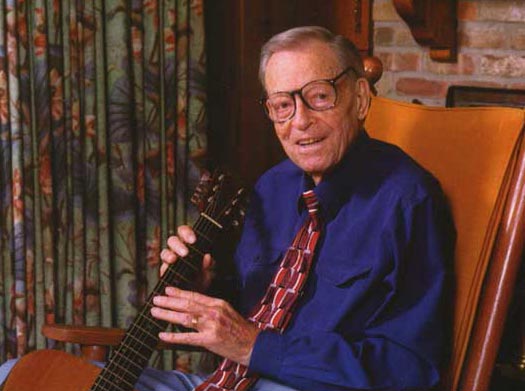31° 19.568′ N, 92° 25.65′ W
Pineville, LA 71360
United States
Historic Site, Historical Marker
Open to the Public
Jimmie Davis served two nonconsecutive terms as governor of Louisiana, from 1944 to 1948 and from 1960 to 1964. In his second term, Davis oversaw the state as the civil rights movement challenged racial segregation and inequality. A segregationist, he supported the separation of Black and white students in public schools. In addition to his career in politics, Davis was a successful gospel music singer and songwriter and Hollywood actor. He is perhaps best known for his song, “You Are My Sunshine,” one of the official state songs of Louisiana. Among other honors, he was elected to the Country Music Hall of Fame and the Louisiana Music Hall of Fame.
Early Life
James Houston Davis was born September 11, 1899, in the rural community of Beech Springs in Jackson Parish, to Samuel Jones and Elizabeth (Works) Davis. The Davis family consisted of eleven children, and the paternal grandparents lived with them for many years. The Davises were sharecroppers and subsistence farmers who nevertheless enjoyed a reputation as community leaders. They garnered reputations as musicians and singers, with grandfather Henry Davis becoming an especially well-known singer. He imparted his love of singing and knowledge of southern folk songs to his grandson.
Jimmie Davis graduated from Louisiana College in 1924 with a bachelor’s degree in history; three years later, he earned a master’s degree in education from Louisiana State University. Throughout his college career, he performed as a street singer to earn money for his tuition. He also sang in various college groups such as the Wildcat Four. Following graduation, Davis taught history and political science at Dodd College in Shreveport and began singing on radio station KWKH. He became a popular local singer and, in 1928, recorded his first records for the Doggone label, which was owned by KWKH. That same year, he campaigned for Judge David Samuel’s reelection. Samuel won and gave Davis a position as clerk in the criminal court.
Musical Career
Davis embarked on a dual career track, one in politics and the other in country music. In 1929, he began a three-year term as a singer for Victor Records. During this time, he recorded extensively in the style of Jimmie Rodgers, the “Father of Country Music,” and experimented with a wide range of musical accompaniment, including jazz bands and African American bluesmen. He eventually settled on a style of country crooning with a western-swing style backing. His career reached its height during his long tenure with Decca Records, with whom he recorded hits such as “Nobody’s Darling But Mine,” “Sweethearts or Strangers,” “Shackles and Chains,” “Where the Old Red River Flows,” and “You Are My Sunshine.” In the 1950s, Davis started to extensively record gospel music and enjoyed a second career in that field with hits such as “Suppertime.”
Political Career
Davis’s success as a musician was mirrored by his achievements in politics. In 1938, he won election as Shreveport police commissioner and, in 1942, as public service commissioner for northern Louisiana. Throughout his political career, Davis maintained a position as an independent Democrat, one who tried to merge the government activism of Longism with reform. In 1944, he was elected governor of Louisiana. His first administration resulted in many accomplishments, despite his enemies’ accusations that he was a “do-nothing” governor. He presided over the implementation of the drivers licensing program and the creation of the state department of wildlife and fisheries. He also continued to expand the state’s infrastructure. He did all of this without raising taxes and while leaving a surplus in the state budget. Davis exhibited only moderate interest in national politics, but he did second the nomination of Harry Truman at the 1944 Democratic convention, the only southerner to do so.
In 1960, Davis won a second gubernatorial term in a race dominated by the issue of racial integration. Davis, like many southern governors, engaged in a program of massive resistance to federal attempts to integrate public facilities in the state. Eventually, however, the state bent to federal authority. Compared to that of most southern governors, Davis’s resistance during the crisis was lukewarm at best, and he remained uncomfortable in his role as a segregationist leader.
Many of the accomplishments of his second term were considered controversial during his tenure but have proven to be remarkably visionary. The building of the Sunshine Bridge over the Mississippi River fueled the growth of the petrochemical industry in the state, for example, and the Toledo Bend Reservoir project provided electricity and recreation facilities to parts of western Louisiana. He also presided over the building of a new governor’s mansion while leaving money in the state treasury.
Later Life
Davis married twice. In 1936 he wed Alvern Davis, a schoolteacher from Shreveport. They later adopted a son, James. Alvern died in 1966 and, two years later, Davis married Anna Carter Gordon, a gospel singer with the group the Chuck Wagon Gang. Together they recorded and performed until his death for various labels, including Word and the Shreveport-based label Plantation.
Davis made a final attempt to gain the governor’s seat in 1972 but failed to make the runoff in a race dominated by Edwin Edwards. In his later years, Davis received many awards and much recognition for his various career successes. He was elected to the Country Music Hall of Fame, the Songwriters Hall of Fame, the Gospel Music Hall of Fame, and the Louisiana Political Hall of Fame. “You Are My Sunshine” was named an official Louisiana state song. Davis died in his sleep on November 5, 2000; he was 101 years old. He was buried at the Jimmie Davis Tabernacle in Jackson Parish.
Content provided by 64 Parishes, a project of the Louisiana Endowment for the Humanities.





